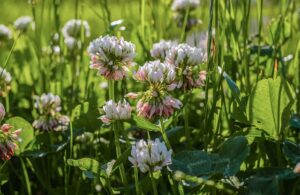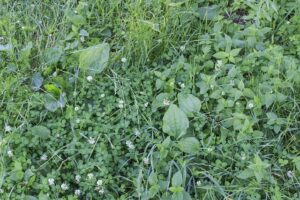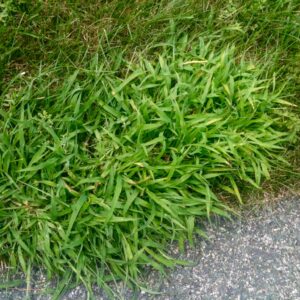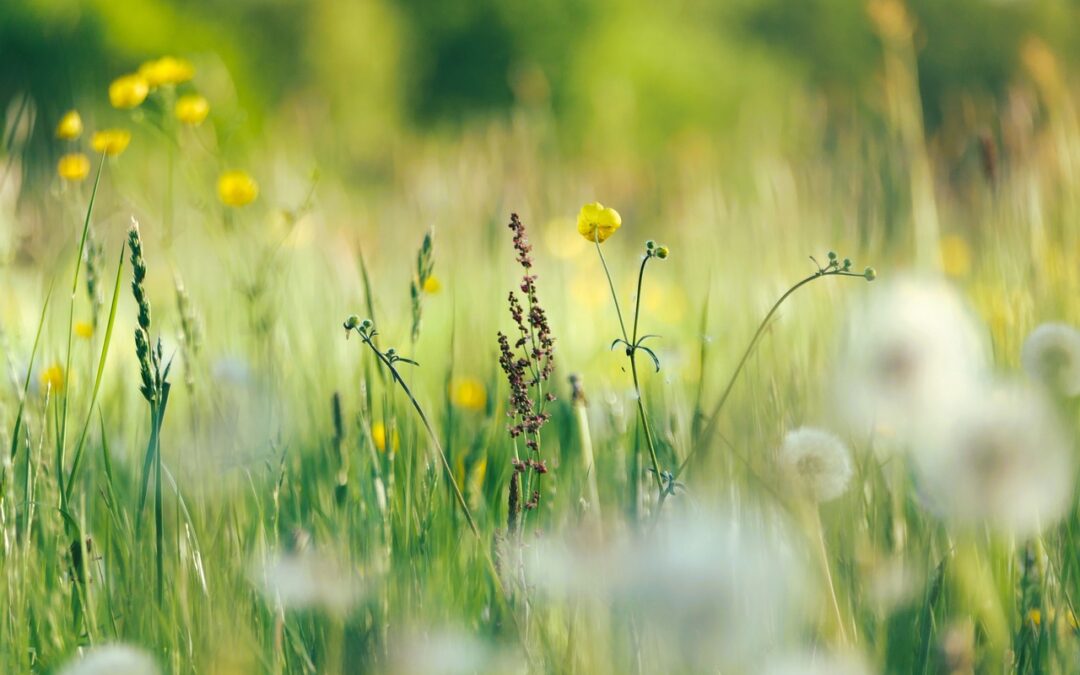What are some of the common weeds found in lawns?
Why are weeds so challenging to manage? Well, many Massachusetts weeds grow rapidly and aren’t picky about their environment. So watch out for these four weeds in Massachusetts that might blow into your yard.
- Dandelions – Dandelions are a frustrating plant because each one produces 15,000 seeds on average! In addition to this, the wind spreads their seeds easily through the lightweight seed puff called the “pappus.”
- Broadleaf plantain – Broadleaf plantain can be tough to manage because its seeds are viable in the soil for up to 60 years! So while you might’ve hand-pulled all the germinated plants, it’s sure to pop up next year.
- Clover – Clover is a weed that thrives everywhere, including infertile soils. The robust plant produces its own nitrogen, so its self-sufficiency keeps it alive and well in many lawns.
- Crabgrass – Unfortunately, crabgrass is one of the most frustrating of them all. Not only is it visible from a mile away, but it’s also exceedingly stubborn. Its root system can be four feet in length, making it irritating to remove by hand. Plus, one crabgrass plant can produce 15x more seeds than a dandelion!
What is crabgrass?
Crabgrass is a common broadleaf weed that gives gardeners and homeowners plenty of trouble. A single plant can produce 150,000 seeds in its lifetime. It thrives in various environments and is one of the most common weeds in New England homeowners’ lawns. In addition, crabgrass is tough and can easily tolerate drought and high temperatures.
What are the top causes of crabgrass and weed growth?
 Of course, an abundance of unwelcome seeds in your lawn kicks off a takeover of weeds. Most of the time, they’ll have flown in from nearby lawns or fields on a windy day. However, there are a couple of factors that are in your control that encourage weeds. These two things can induce weed growth.
Of course, an abundance of unwelcome seeds in your lawn kicks off a takeover of weeds. Most of the time, they’ll have flown in from nearby lawns or fields on a windy day. However, there are a couple of factors that are in your control that encourage weeds. These two things can induce weed growth.
- Improper watering. Did you know that light, frequent watering doesn’t help the grass develop strongly? Light watering prevents the water from being fully absorbed into the deeper soil levels, so the grassroots never get nourished. On the other hand, overwatering weakens the lawn by causing root rot and suffocating the roots.
- Unhealthy lawn. Usually, an underfed lawn leads to two things: thinness and weakness. Ultimately, this condition lets diseases, pests, and weeds run wild because the grass is too weak to withstand them. This is why year-round lawn maintenance is essential for increasing competitiveness.
How can I prevent crabgrass in my lawn?
Thankfully, you only need some TLC and research to prevent crabgrass from invading your lawn. So get started on these essential lawn care tasks now to prevent unwanted greenery next growing season.
- Seed bare spots. Since weeds are so hardy, they will happily squeeze into any empty space within your yard. Prevent weeds from taking over unoccupied soil by overseeding empty lawn patches and thoroughly watering until they germinate.
- Routinely fertilize. Thick lawns are far better at competing against surrounding weeds, so ensure your grass is nourished with fertilizing services. While they can thrive in infertile soil, your lawn can’t. So fertilize for a lush, dense yard that blocks weeds from succeeding.
- Water deeply and less frequently. Encourage grass growth over weed growth by opting for a deep watering routine. Heavy, occasional watering up to 3 times a week increases the depth that the water reaches and prevents grass roots from drowning in consistently wet soil.
- Mow on a schedule. Maintaining a consistent grass height stops weeds from fruiting and improves lawn density. Mow weekly to boost your grass’s photosynthesis efficiency and chop down any weeds before they flower and produce seeds.
How can I treat crabgrass on my lawn?
 Now that you know how to get to the root of the problem, it’s time to eradicate crabgrass and other weeds currently taking up your space. There are three options to stop weeds in their tracks.
Now that you know how to get to the root of the problem, it’s time to eradicate crabgrass and other weeds currently taking up your space. There are three options to stop weeds in their tracks.
- Pre-emergent control products. Control products that target seeds before they germinate often successfully prevent a full-blown outbreak in your lawn come spring. The product forms a barrier on the soil surface that quickly stops the growing process when the crabgrass seeds produce a root.
- Hand-pick smaller patches of crabgrass. A few spotted patches here and there can be dealt with by hand. Pull up the weeds with a shovel or spade and dispose of them in a plastic bag. Avoid tossing the weeds anywhere in your lawn, as the seeds will find their way back to you. Plus, remove all the roots, or the crabgrass could grow back!
- Post-emergent control products. Sometimes, weeds can completely take over a lawn in no time. If this is the case, applying a post-emergent on the young, germinated crabgrass is the best way to eliminate them. A lawn care company can safely and effectively apply these products to rapidly remove the problem and protect your established lawn.
Is crabgrass creeping into your lawn? Thwart it with reputable lawn care.
Weeds are nasty adversaries that every lawn owner will face at one point. Crabgrass and other undesirable plants will likely pop up as the weather warms, but you don’t have to surrender your lawn to them. Instead, lean on your local lawn care company to maintain your lawn’s vitality and durability so that it can stop weeds independently. Our Sterling lawn care specialists have the expertise to stop weeds in their tracks with preventative and treatment methods for crabgrass.
With spring in full swing, crabgrass and weed growth are on the rise. Our Eastern Mass lawn care team will tackle tough weeds with high-quality broadleaf weed control today. Please call us at (508) 281-1441 or contact us here. For more tips and tricks from the experts, visit our blog.


Recent Comments